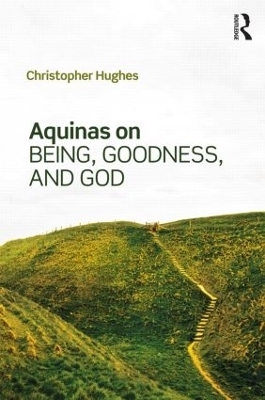
Aquinas on Being, Goodness, and God
Seiten
2015
Routledge (Verlag)
978-0-415-34644-3 (ISBN)
Routledge (Verlag)
978-0-415-34644-3 (ISBN)
Christophe Hughes focuses on the philosophical Aquinas; beginning with a chapter on his life and works he goes on to discuss Aquinas's metaphysics and his theory of human beings in general, covering his ideas about body and soul, the mind, and free will.
Thomas Aquinas is one of the most important figures in the history of philosophy and philosophical theology. Relying on a deep understanding of Aristotle, Aquinas developed a metaphysical framework that is comprehensive, detailed, and flexible. Within that framework, he formulated a range of strikingly original and carefully explicated views in areas including natural theology, philosophy of mind, philosophical psychology, and ethics.
In this book, Christopher Hughes focuses on Aquinas’s thought from an analytic philosophical perspective. After an overview of Aquinas’s life and works, Hughes discusses Aquinas’s metaphysics, including his conception of substance, matter, and form, and his account of essence and existence; and his theory of the nature of human beings, including his critique of a substance dualism that Aquinas attributes to Plato, but is usually associated with Descartes. In the final chapters, Hughes discusses Aquinas’s account of the existence and nature of God, and his treatment of the problem of evil, as well as his ideas about the relation of goodness to being, choice, and happiness.
Aquinas on Being, Goodness, and God is essential reading for students and scholars of Aquinas, and anyone interested in philosophy of religion or the history of medieval philosophy.
Thomas Aquinas is one of the most important figures in the history of philosophy and philosophical theology. Relying on a deep understanding of Aristotle, Aquinas developed a metaphysical framework that is comprehensive, detailed, and flexible. Within that framework, he formulated a range of strikingly original and carefully explicated views in areas including natural theology, philosophy of mind, philosophical psychology, and ethics.
In this book, Christopher Hughes focuses on Aquinas’s thought from an analytic philosophical perspective. After an overview of Aquinas’s life and works, Hughes discusses Aquinas’s metaphysics, including his conception of substance, matter, and form, and his account of essence and existence; and his theory of the nature of human beings, including his critique of a substance dualism that Aquinas attributes to Plato, but is usually associated with Descartes. In the final chapters, Hughes discusses Aquinas’s account of the existence and nature of God, and his treatment of the problem of evil, as well as his ideas about the relation of goodness to being, choice, and happiness.
Aquinas on Being, Goodness, and God is essential reading for students and scholars of Aquinas, and anyone interested in philosophy of religion or the history of medieval philosophy.
Christopher Hughes is Reader in Philosophy at King’s College London, UK. Before coming to London, he taught at Cornell University, USA. He is the author of Kripke: Names, Necessity, and Identity (2004).
1. Life and Works 2. Being 3. Human Beings 4. God 5. Goodness. Index
| Erscheint lt. Verlag | 11.3.2015 |
|---|---|
| Verlagsort | London |
| Sprache | englisch |
| Maße | 156 x 234 mm |
| Gewicht | 680 g |
| Themenwelt | Geisteswissenschaften ► Philosophie ► Metaphysik / Ontologie |
| Geisteswissenschaften ► Philosophie ► Philosophie des Mittelalters | |
| Geisteswissenschaften ► Religion / Theologie | |
| ISBN-10 | 0-415-34644-4 / 0415346444 |
| ISBN-13 | 978-0-415-34644-3 / 9780415346443 |
| Zustand | Neuware |
| Haben Sie eine Frage zum Produkt? |
Mehr entdecken
aus dem Bereich
aus dem Bereich
Buch | Hardcover (2024)
Matthes & Seitz (Verlag)
CHF 41,90
Über konstruktivistisches Denken in der Theologie
Buch | Softcover (2024)
Verlag Herder
CHF 79,95


